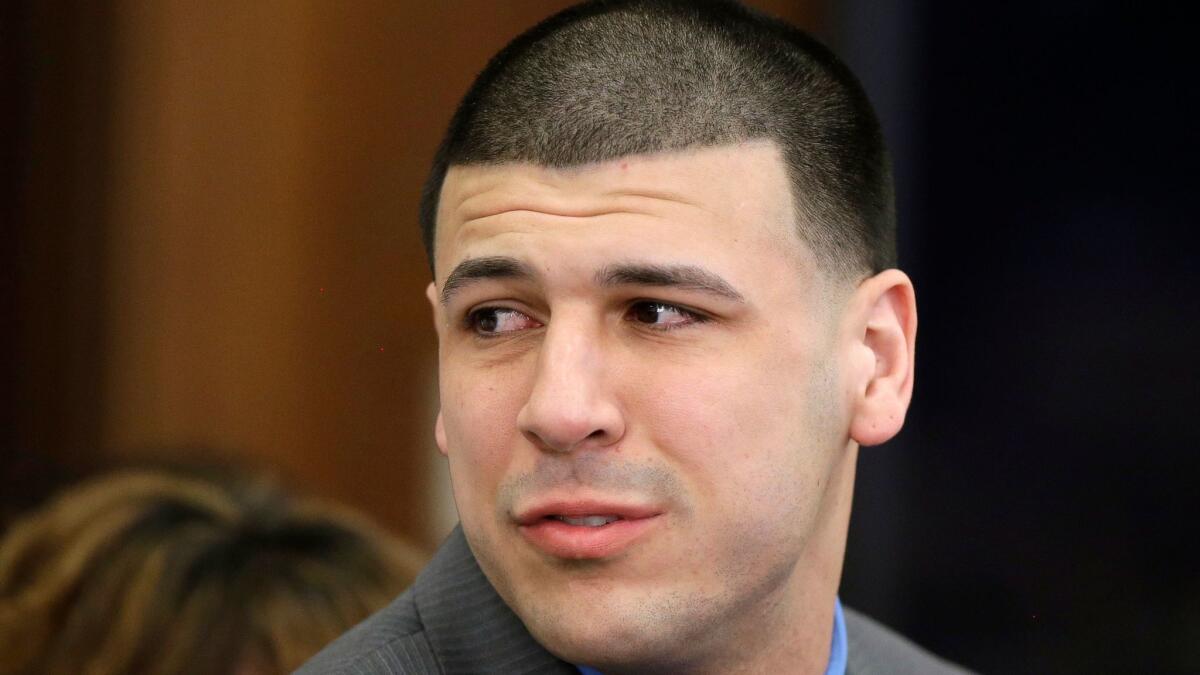Disgraced ex-Patriots player Aaron Hernandez found to have CTE and early brain atrophy

- Share via
Five months after Aaron Hernandez hanged himself in a prison cell with a bedsheet while serving a life sentence for first-degree murder, the former New England Patriots tight end has been diagnosed with severe chronic traumatic encephalopathy.
Hernandez, who died at age 27, is one of the youngest former NFL players found to have the devastating disease linked to repeated brain trauma.
In an announcement Thursday, Boston University’s CTE Center said doctors diagnosed Hernandez with Stage 3 CTE. Stage 4 is the most serious. Both stages, usually found in much older former players, are associated with aggressiveness, impulsivity, depression and memory loss.
The effort, led by Dr. Ann McKee, also found he had “early brain atrophy” and “large perforations” on a central membrane in his brain.
At the same time Thursday, Hernandez’s fiancee, Shayanna Jenkins-Hernandez, sued the NFL and the Patriots on behalf of the couple’s daughter in U.S. District Court in Boston. The complaint seeks $20 million for “loss of parental consortium.”
An NFL spokesman said the league hadn’t seen the lawsuit and couldn’t comment at this time.
The lawsuit could face significant hurdles. The settlement to concussion litigation between former players and the NFL applies to all players retired as of July 7, 2014. Hernandez last played in 2013 and wasn’t among the 150 or so former players who opted out of the settlement. The former players and family members participating in the settlement are barred from suing the NFL over head injuries — regardless of if they receive cash payouts from the deal.
“In short, Mr. Hernandez’s family probably can’t successfully sue because their claims are all wrapped up in the concussion class-action settlement,” Derek Muller, an assistant law professor at Pepperdine, wrote in an analysis of the lawsuit. “Because they didn’t opt out, they’re bound by it.”
Hernandez, who played 38 regular-season games over three seasons with the Patriots, was convicted in 2015 in the murder of Odin Lloyd. In 2017, he was acquitted in a double-homicide case. Five days after that, he killed himself.
Hernandez is at least the 19th former NFL player to take their life since 2005. Of those suicides, nine were later found to have CTE. The disease can be definitively diagnosed only after death.
A study published earlier this year in the Journal of the American Medical Assn. found 110 of 111 brains of former NFL players studied showed signs of CTE.
Pro Football Hall of Famer Mike Webster, who died in 2002, was the first player to be diagnosed with CTE. A slew of prominent players have followed, including Frank Gifford, John Mackey and Junior Seau.
Twitter: @nathanfenno
UPDATES:
2:58 p.m.: This article was updated with the NFL declining comment and with details of a lawsuit against the league over Hernandez’s death.
This article was originally published at 1:50 p.m.
More to Read
Go beyond the scoreboard
Get the latest on L.A.'s teams in the daily Sports Report newsletter.
You may occasionally receive promotional content from the Los Angeles Times.











